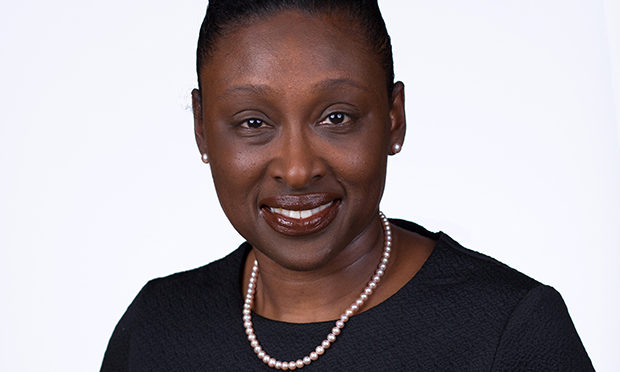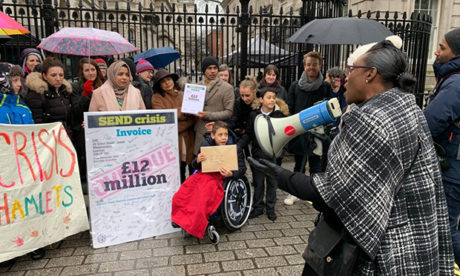Town Hall education boss lays out hopes for the future as schools reopen

Hackney’s deputy mayor and lead councillor for education Anntoinette Bramble catches herself midway through our interview and laughs: “I feel like I’m going for the interview for education secretary.”
While former teacher Bramble is not currently in the running for Gavin Williamson’s job, like all in local government she has found herself in the policy-making hotseat during the biggest crisis to hit the country in a century, with our discussion naturally turning to what can be learned and what government reforms she feels should be implemented following the biggest trauma to hit the education world in generations.
We’re speaking in the same month Hackney schools have reopened to all students, with both pupils and staff re-entering familiar buildings in markedly unfamiliar circumstances. Supporting physical and mental health and wellbeing in schools has been key to the Town Hall in making sure that the borough’s children can return safely, with none at time of writing having to close their doors due to an outbreak.
In Bramble’s view, in the future a more holistic approach to education will be essential. Drawing on her own experience as an early years teacher, she accepts that children learn in different ways as they grow older, but questions why the ethos of early years helping young people explore the world around them through play and curiosity cannot be kept throughout a student’s entire experience.
Bramble said: “We talk a lot about children in terms of the output of their education, but we don’t talk about children in terms of their health and wellbeing, their aspirations, their enjoyment of school.
“The enjoyment of school turns a child from a case where they are surviving in school, to thriving and coming into their being. It’s not a case of them just going to school to learn, but we’re talking about an educational experience.
“Early years get it really well, but all that early years training dissipates in the system. I don’t blame teachers for that – we have to look at the curriculum and expectations of school environment. Why can’t we evoke and keep that curiosity as children grow through the education system, in whatever iteration that looks like?
“During the pandemic we have had to think of different ways of learning and engaging, and there has been an opportunity for that broader curriculum learning experience to happen? How do we capture some of that, and push government to allow that in the system?”
Bramble also questioned whether Ofsted’s role should “evolve,” and that the organisation should rethink its position, arguing that while the organisation may argue that it stepped back to allow schools space during lockdown, it did not “adapt and change swiftly” as schools have done, envisaging in its place an accountability framework for schools that is also “flexible and responsive.”
The councillor added: “We also had a year where no children have had exams. Do we need to rethink the models of a mixture of exams and assessments, and what that looks like?
“We have finally seen the value of teacher assessment. There was a big U-turn, as who knew, an algorithm that disproportionately affected you by your postcode was not going to be the right thing to do? Who knew, Tory government? We knew, but you weren’t listening.
“What the pandemic did is provide an opportunity for the professional judgment of teachers, and the devaluing that sometimes happens around teachers, to be re-evaluated. How do we better use some of that in the system going forward?”

The local re-opening described by Bramble took place with a mixture of caution and excitement, with teachers and pupils in the main both eager to reunite while governed by meticulous risk assessments, social distancing arrangements, and planning for outbreaks, with scenario documents in place to lay out every iteration of what should take place should a child or member of staff test positive for Covid-19.
Councillors had been alarmed to see developing evidence of a yawning inequality gap caused by the lockdown back in July, after a report by the Education Endowment Foundation found the likely impact of lockdown will see a reversal of the last ten years of progress in closing the attainment gap.
A call-out for spare laptops for children cut off by the digital divide is still ongoing, with Hackney Learning Trust figures showing that 10 per cent of the borough’s children have no devices at all, with 15 per cent sharing too much or having no access to enough bandwidth to be able to access educational materials.
Bramble speaks reassuringly about schools working “methodically and thoughtfully” to identify missed learning and which pupils need extra tuition, whilst stressing the importance of the Town Hall continuing to play a part in supporting educators on health and wellbeing, both for students and for vulnerable staff.
She said: “I have always been conscious of post-traumatic stress in Covid. Everybody thinks you’re okay, and if you’re high-functioning and busy, you think you’re okay.
“But there is nothing normal and okay about going through a pandemic, and we have not seen the back of it – we are in a new phase, so how we support schools in this phase is critical.”
This dialogue between council and schools on health and wellbeing is playing out concurrently with an extended anti-racist platform of work undertaken by the council, following a motion in solidarity with Black Lives Matter passed in July.
Schools in Hackney will now have access to resources worked up by the Town Hall which provide them a “scaffolding” to help schools either add to the anti-racist teaching they already undertake, use it for new ideas, or get them started wherever they are on the process.
The deputy mayor declared herself “passionate” about these local reforms, with her administration working with teachers over the holidays on the relevance of Black history, linking through to other parts of the curriculum such as geography, with Bramble finding that Hackney schools have been eager to make a change.
She said: “We are talking about the pieces that have been left out of our history. I’m very proud to be British, but actually the work of my ancestors is not really mapped out and taught in the way that it needs to be, for everyone to feel a sense of place – not just for me as a Black person, but for any British person to really understand where we all are and how we come together.
“Schools have wanted to engage on this. Some were saying, we really want to do something but we don’t know what to do. A real willingness from schools, some have written to her to say what they are doing and celebrate what they are doing.
“This is important because terrible things are still happening to Black people. That is why we need to do this. It doesn’t matter what you do and who you are, you are still judged by the colour of your skin. It’s really important for all of us in Britain to understand the role that Black people made in building our country that we are all so proud to celebrate, and the importance of diversity and the role it’s played.
“We don’t celebrate the difference and the contributions enough, and it’s great that our schools want to be part of that journey and show a willingness.”
Bramble’s council will now be monitoring the demand for mental health services from students, as schools move from their “immediate focus” of opening their doors safely, as well as reassuring children and parents that it could be done.
As schools navigate staggered finish and start times, broken-up lunch breaks, one-way systems, and all the other new realities of a Covid world, the deputy mayor spoke of the vigilance necessary of what help needs to be in place for young people as they “re-learn their new environment”.
However, amongst this widespread uncertainty, Bramble remains clear that in schools, the future must not return to the pre-Covid status quo: “What we have to remember is that normal did not work for everyone, so really we don’t want to go back to a new normal.
“We want to build back better, and in a way that does not leave children behind in the ways it did before.”
